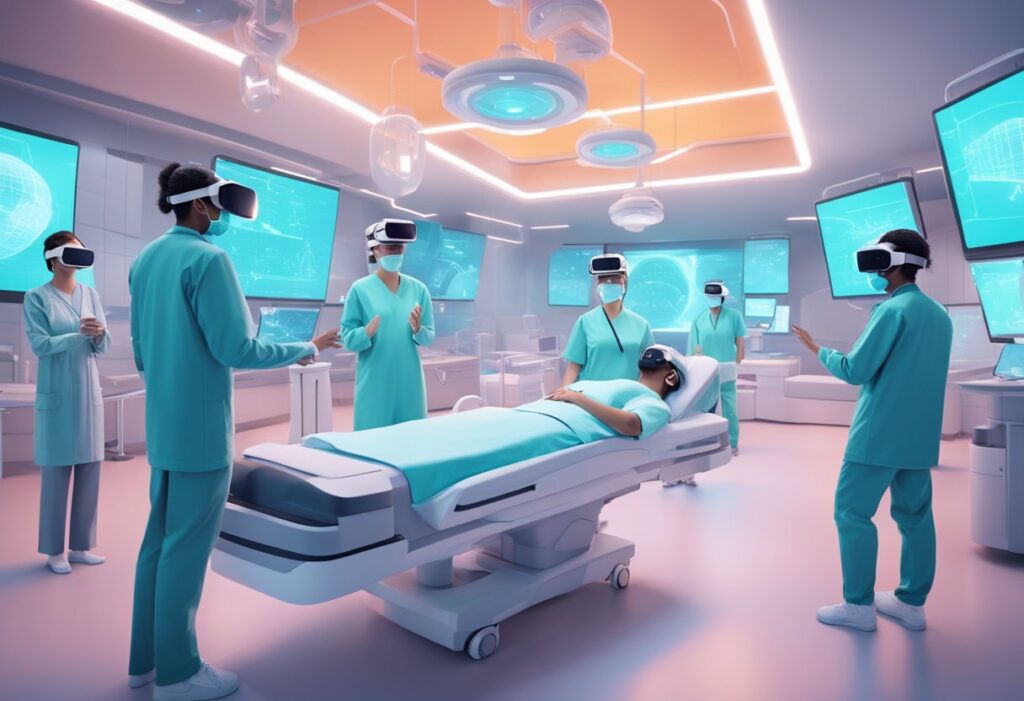The metaverse is an emerging concept that involves the convergence of three major technological trends, which all have the potential to impact healthcare individually. Together, though, they could create entirely new channels for healthcare delivery, education, and research. The potential of the metaverse in healthcare is vast, and it is an area that is currently being explored by researchers, healthcare providers, and technology companies.
The metaverse can offer a range of technologies that can improve access, quality, and cost of healthcare, such as extended reality (XR), blockchain, and M-worlds. XR technologies, for example, can create virtual environments that simulate real-life scenarios, allowing healthcare providers to train in a safe and controlled environment. Blockchain technology can be used to securely store and share patient data, enabling more efficient and effective healthcare delivery. M-worlds, or medical worlds, can provide patients with virtual environments that help them better understand their health conditions and treatments.
The development of the metaverse for intelligent healthcare is an exciting area of research that has the potential to revolutionize the healthcare industry. As the metaverse continues to evolve, it will be interesting to see how it is integrated into healthcare delivery and how it can be used to improve patient outcomes.
The Metaverse in Healthcare: An Overview
The metaverse is a virtual space that allows users to interact with a computer-generated environment and other users in real-time. The concept of the metaverse has been around for a while, but with the advancements in technology, it is now becoming a reality. The healthcare industry is one of the sectors that can benefit significantly from the metaverse.
How Healthcare Works in the Metaverse
In the metaverse, healthcare can be delivered remotely, and patients can access medical services from anywhere in the world. Medical professionals can use virtual reality (VR) and augmented reality (AR) technologies to diagnose and treat patients. Patients can also use these technologies to learn about their medical conditions and treatments.
Potential of Virtual Reality and Augmented Reality in Healthcare
VR and AR technologies have the potential to revolutionize the healthcare industry. VR can be used to simulate medical procedures, which can help medical professionals to prepare for surgeries and other complex procedures.
AR can be used to overlay digital information on real-world objects, which can help medical professionals to visualize medical conditions and treatments.
The Role of Extended Reality in Medical Training and Education
Extended Reality (XR) is a term that encompasses VR, AR, and mixed reality (MR) technologies. XR can be used to provide medical training and education to medical professionals and students.
Medical students can use XR to learn about medical procedures and treatments in a safe and controlled environment. Medical professionals can use XR to keep up with the latest medical advancements and technologies.
The metaverse has the potential to transform the healthcare industry. VR, AR, and XR technologies can be used to deliver medical services remotely, simulate medical procedures, and provide medical training and education. The healthcare industry can benefit significantly from the metaverse, and it is only a matter of time before we see more applications of these technologies in healthcare.
Innovative Metaverse Applications in Healthcare
The metaverse is an innovative concept that has the potential to revolutionize healthcare by providing new channels for treatment, therapy, and rehabilitation. Here are some of the innovative metaverse applications in healthcare:
Digital Twins for Personalized Treatment
Digital twins are virtual replicas of the human body that can be used to simulate and personalize treatment plans. By using digital twins, healthcare providers can create personalized treatment plans that are tailored to each patient’s unique needs.
Digital twins can be used to simulate the effects of treatments, medications, and surgeries before they are applied to the patient, reducing the risk of complications and side effects.
Immersive Therapy and Rehabilitation
Immersive therapy and rehabilitation are innovative applications of the metaverse that can help patients recover from injuries and illnesses.
By using virtual reality (VR) and augmented reality (AR) technologies, healthcare providers can create immersive environments that simulate real-world scenarios. These environments can be used to help patients regain mobility, strength, and coordination after an injury or illness.
Surgical Planning and Remote Surgery
Surgical planning and remote surgery are innovative applications of the metaverse that can help healthcare providers perform surgeries more efficiently and accurately.
By using digital twins and augmented reality technologies, surgeons can plan and simulate surgeries before they are performed. This can reduce the risk of complications and improve patient outcomes. Remote surgery can be performed by using telepresence technologies, allowing surgeons to perform surgeries from remote locations.
The metaverse has the potential to revolutionize healthcare by providing innovative applications that can improve treatment, therapy, and rehabilitation. Digital twins, immersive therapy and rehabilitation, and surgical planning and remote surgery are just a few examples of the innovative applications of the metaverse in healthcare.
Technology and Infrastructure in the Metaverse healthcare

The metaverse is a virtual space that is created using various technologies and infrastructure. The success of the metaverse in healthcare depends on the use of robust and secure technologies and infrastructure. The following subsections discuss the technologies and infrastructure that are essential for the successful implementation of the metaverse in healthcare.
Blockchain and Data Security
Blockchain technology is a distributed ledger that provides a secure and transparent way of storing data. In healthcare, blockchain can be used to store patient data securely and ensure that it is not tampered with.
The use of blockchain technology in the metaverse can ensure that patient data is secure and can only be accessed by authorized personnel. This can help to prevent data breaches and ensure that patient privacy is maintained.
Cloud Computing and Data Management
Cloud computing is a technology that allows data to be stored and accessed over the internet. In healthcare, cloud computing can be used to store and manage patient data.
The use of cloud computing in the metaverse can ensure that patient data is available to healthcare providers when they need it. This can help to improve patient care and ensure that healthcare providers have access to the latest patient information.
Connectivity and Interoperability
Connectivity and interoperability are essential for the successful implementation of the metaverse in healthcare. The metaverse must be able to connect to various healthcare systems and devices to ensure that patient data is available to healthcare providers.
Interoperability can ensure that patient data can be shared between different healthcare providers and systems. This can help to improve patient care and ensure that healthcare providers have access to the latest patient information.
The successful implementation of the metaverse in healthcare depends on the use of robust and secure technologies and infrastructure.
The use of blockchain technology, cloud computing, and interoperability can ensure that patient data is secure, available, and accessible to healthcare providers. The metaverse can help to improve patient care and ensure that healthcare providers have access to the latest patient information.

Challenges and Considerations for Adoption
Privacy and Ethical Implications
One of the main challenges associated with the adoption of metaverse technology in healthcare is the potential for privacy and ethical implications. As the technology continues to evolve, there is a risk that personal data could be compromised, leading to serious privacy concerns. In addition, there may be ethical concerns related to the use of this technology in healthcare, particularly in terms of patient autonomy and informed consent.
To address these concerns, it is important for healthcare providers and technology developers to work together to establish clear guidelines and standards for the use of metaverse technology in healthcare. This includes implementing robust data protection measures and ensuring that patients are fully informed about the risks and benefits of using this technology.
Overcoming Barriers to Adoption
Another key challenge in the adoption of metaverse technology in healthcare is overcoming the various barriers that may prevent its widespread use. These barriers include issues related to cost, interoperability, and regulatory compliance.
To overcome these barriers, it is important for healthcare providers and technology developers to work together to develop innovative solutions that can help to reduce costs and improve interoperability. This may involve developing new technologies or adapting existing ones to better meet the needs of healthcare providers and patients.
Ensuring Equitable Access and Outcomes
Finally, it is important to ensure that the adoption of metaverse technology in healthcare is done in a way that promotes equitable access and outcomes for all patients. This means taking steps to ensure that the technology is accessible to all patients, regardless of their socioeconomic status or geographic location.
To achieve this goal, healthcare providers and technology developers must work together to develop innovative solutions that can help to reduce costs and improve access to care. This may involve partnering with community organizations or leveraging existing infrastructure to improve healthcare delivery in underserved areas.
While there are certainly challenges associated with the adoption of metaverse technology in healthcare, there are also many opportunities to improve patient outcomes and promote greater access to care. By working together, healthcare providers and technology developers can help to overcome these challenges and create a more equitable and effective healthcare system for all patients.
The Future of Healthcare in the Metaverse
The concept of the metaverse has been around for a while, but it is only recently that it has become a reality. With the advent of new digital technologies and infrastructure, the healthcare industry is poised for a transformational change. The metaverse is expected to play a significant role in this transformation.
Predictions for Healthcare Transformation
According to healthcare professionals, the metaverse is expected to transform the healthcare ecosystem in the future.
Almost all (84%) of healthcare professionals believe that the metaverse will have a significant impact on the region’s healthcare industry. The metaverse is expected to change the way healthcare services are delivered, making them more accessible, affordable, and convenient.
The Role of AI and Machine Learning
Artificial intelligence (AI) and machine learning (ML) are expected to play a significant role in the metaverse’s healthcare industry.
The metaverse will provide healthcare professionals with a vast amount of data that can be used to develop accurate diagnoses and treatment plans. AI and ML algorithms can analyze this data and provide personalized treatment plans for patients.
Emerging Technologies and Innovations
The metaverse will also bring about a host of emerging technologies and innovations, which will further transform the healthcare industry.
These technologies include virtual reality, augmented reality, wearables, and remote monitoring devices. These technologies will make healthcare services more accessible, convenient, and affordable for patients.
The metaverse is expected to transform the healthcare industry in the future. Healthcare professionals need to prepare for this transformational change and ensure that their patients are ready as well.
The metaverse will bring about a host of emerging technologies and innovations, which will further improve healthcare services’ accessibility, affordability, and convenience.

Frequently Asked Questions
How is virtual reality shaping patient care in hospitals?
Virtual reality is shaping patient care in hospitals by providing a more immersive and interactive experience for patients. VR can help reduce anxiety, stress, and pain in patients by transporting them to a different environment and allowing them to engage in activities that distract them from their illness or injury.
VR can also be used to train healthcare professionals and simulate medical procedures, which can improve patient outcomes.
How is metaverse used in healthcare?
The metaverse is used in healthcare to provide a more personalized and engaging experience for patients. It can be used to create virtual clinics, where patients can receive medical consultations and treatment from the comfort of their own homes. The metaverse can also be used to provide mental health support and wellness programs, which can help patients manage their conditions and improve their quality of life.
What is Meta doing in healthcare?
Meta (formerly Facebook) is exploring the potential of the metaverse in healthcare by partnering with healthcare organizations and investing in research and development. They are working on developing virtual clinics, telemedicine platforms, and mental health support programs to improve patient outcomes and access to care.
How does the metaverse affect your health?
The metaverse can affect your health in both positive and negative ways. On the positive side, it can provide access to healthcare services and support programs that may not be available in your local area.
It can also help reduce stress and anxiety, which can have a positive impact on your mental health. However, excessive use of the metaverse can lead to sedentary behavior, which can increase the risk of obesity and other health problems.
How can the metaverse contribute to mental health and wellness programs?
The metaverse can contribute to mental health and wellness programs by providing a more engaging and interactive experience for patients. It can be used to create virtual support groups, mindfulness programs, and other therapeutic interventions that can help patients manage their conditions and improve their mental health.
What initiatives is Meta undertaking to integrate with healthcare services?
Meta is undertaking several initiatives to integrate with healthcare services, including partnering with healthcare organizations, investing in research and development, and developing new virtual healthcare platforms and applications. They are also working on improving data privacy and security to ensure that patient information is protected.
How the metaverse can help mental health?
The metaverse can help mental health by providing access to virtual support groups, mindfulness programs, and other therapeutic interventions that can help patients manage their conditions and improve their mental health. It can also provide a more engaging and interactive experience for patients, which can help reduce stress and anxiety.
Why is meta-analysis important in healthcare?
Meta-analysis is important in healthcare because it allows researchers to combine data from multiple studies to provide a more comprehensive and accurate picture of the effectiveness of a particular treatment or intervention. This can help healthcare professionals make more informed decisions about patient care and improve patient outcomes.
What is meta-analysis in medicine?
Meta-analysis in medicine is a statistical technique that involves combining data from multiple studies to provide a more comprehensive and accurate picture of the effectiveness of a particular treatment or intervention. It is used to identify patterns and trends in the data and to provide evidence-based recommendations for patient care.














